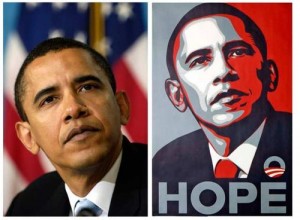Exhausted, Photographer Drops Out of Fairey-AP Lawsuit
It’s bad enough that copyright litigation isn’t cheap. Add the emotional, physical, and psychological toll it takes on litigants and you have a good recipe for surrender. I talk about this quite a bit with artists who ask me if they should pursue litigation against infringers, or litigation against copyright owners by “free culture” advocates wanting to test (and expand) the fair use standard under copyright law. The answer: according to some litigators, a plaintiff is going to spend not only quite a bit of money, but the time requirements will also drain a plaintiff’s creative output by exhausting her physically, emotionally, and psychologically. Instead of spending time in her studio, an artist will be overwhelmed with e-mails, telephone calls, and meetings with her lawyers, not to mention the discovery phase. If she’s lucky (and I’m being sarcastic here), she’ll spend a bit less time in settlement talks.
Sure enough, and just in time for my next copyright class, the photographer embroiled in the AP-Shepard Fairey lawsuit has decided to drop out of the three-way battle. Mannie Garcia has told the LA Times that “the legal proceedings have ‘taken a toll on [Garcia] personally and professionally. He thought he’d be better suited to focus his efforts on what he knows, taking photographs like the Obama image.'”
The AP has also decided to drop their claim against Mannie Garcia. In case anyone has forgotten, both the AP and Garcia were fighting over the copyright to the now infamous photograph of Barack Obama.
The LA Times also reports that there are settlement talks in the works. The Times article can be accessed here.
UPDATE: August 23, 2010. 5:25pm EST
The Associated Press is very pleased with Mannie Garcia’s withdrawal. The AP’s official statement below.
AP pleased with withdrawal of Mannie Garcia from Shepard Fairey case
The Associated Press is very pleased that Mannie Garcia has withdrawn from the case with prejudice, meaning that he cannot refile his claim against the AP. The AP has not wavered in its belief that Mr. Garcia was a staff photographer at the time he took the image of then-Sen. Barack Obama, that AP properly employed Mr. Garcia, and that AP is the rightful copyright owner of the photo in question. Further, the AP is pleased that Mr. Garcia voluntarily withdrew without any payment or consideration of any kind — this was not a settlement.
In a Court hearing on Monday, Judge Alvin Hellerstein indicated that he would sign the stipulation and enter the order. Also in Monday’s hearing, the judge set both a summary judgment schedule and a trial schedule for the case involving Shepard Fairey. The AP is happy to have these dates set. The AP continues to be confident in its position that the use Fairey made of its photo is not fair use, but one that should have been licensed so as to help ensure the AP’s photographers will be able to continue creating new works. The AP looks forward to resolution whether through summary judgment or trial on the merits. — From Paul Colford, AP Director of Media Relations
Tags: Art Law, employment contracts, fair use, independent contractors, intellectual property, photography, work for hire




It really is too bad that the copier wins by default. That artists cannot protect their art and the right to profit from it.
While I understand why the photographer dropped out, it is a shame that he did. This is a defacto win for the bad guys.
S,
Not so fast. The lawsuit is still ongoing. You may recall the Garcia was the photographer that took that photo Fairey used for his Hope poster. At first Garcia disclaimed copyright ownership over the photo, but then changed his mind and sued the AP claiming he, not the AP, owned the copyright.
The lawsuit is still ongoing between the AP and Shepard Fairey though, so you may still “win.” Stay tuned!
I am sorry to learn that once again it seems that a corporate interest (AP) can run roughshod over the rights of an artist (Garcia). Fairey’s use of the photo has undoubtedly raised Garcia’s profile and has probably led to increased work (and fees) for him, but that seems like a small compensation for the loss to AP of the copyright in his work – a loss that apparently came about not because of employment agreements or written transfer but simply because AP has bigger lawyers. Fortunately Fairey may end up defending Garcia’s rights. The strongest argument Fairey has is that the copyright belongs to Garcia, not AP, and so AP has no standing to sue for infringement.
Hi Peter,
Thanks for your comments. I know we disagree on the Fairey vs. AP fiasco, and although I do agree with your thoughts on Garcia, I would place more blame on Fairey for not going about this in a better and more business-savy manner. My understanding is that he was offered a licensing deal by the AP when this started, and he turned it down. Now, for his selfish ways, he faces not only criminal charges but the potential to lose this very-important fair use case.
Additionally, we do not know what happened between the AP and Garcia. For all we know, Garcia may have been compensated, or better yet, Garcia’s lawyers may have informed him that proving he was the rightful copyright owner would have been an uphill and losing battle.
-sms